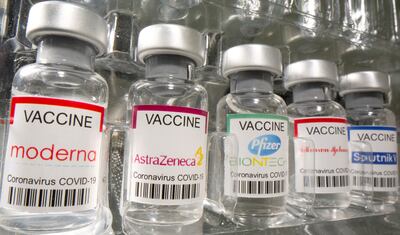A modified vaccine aimed at the Omicron coronavirus variant is being developed by Oxford University and AstraZeneca.
Scientists at the British laboratory are intensifying their efforts to find an adjusted inoculation that will slow the spread of the highly virulent mutation, it was confirmed on Wednesday.
It is understood that they have begun adapting the vaccine, two billion doses of which have been delivered worldwide, to be used early in the new year.
The news is a boost for AstraZeneca which has had to contend with negative publicity over a rare blood clot reaction to its original vaccine and research suggesting its double doses were lest effective against Omicron, compared to other shots.
The advance in tackling the new mutation was confirmed by the research group leader at Oxford University.
“Like with many previous variants of concern, and together with our partners AstraZeneca, we have taken preliminary steps in producing an updated vaccine in case it is needed,” Sandy Douglas told the Financial Times.

He referred to the ‘adenovirus’ that causes the common cold, which was used in the AstraZeneca development and is common in many vaccines.
“Adenovirus-based vaccines could in principle be used to respond to any new variant more rapidly than some may previously have realised. [They have] really important advantages, especially where need and logistical challenges are greatest,” he said.
The disclosure means that AstraZeneca will compete with other vaccines in adapting their formulas to combat Omicron.
“Together with Oxford University, we have taken preliminary steps in producing an Omicron variant vaccine, in case it is needed and will be informed by emerging data,” Mr Douglas said.
A study in The Lancet medical journal on Monday suggested that after three months people's immunity induced by AstraZeneca shots began to wane, including against severe disease.
This has further increased the need for people with that vaccine to get booster shots, particularly in Britain and Europe where the majority of early vaccines were AstraZeneca.
But researchers at Oxford and AstraZeneca are optimistic that their advances will enable to them to deliver an adjusted vaccine within 100 days of the development target, from identifying the pathogen to mass production.
The firm could potentially develop millions of vaccines, particularly in partnership with India’s Serum Institute, which would be available for worldwide distribution.
It will then be up to global regulators to consider if Omicron vaccines are required.
New research from America has also suggested that people who have had two vaccine doses could develop ‘super immunity’ against Covid.
A study by Oregon Health & Science University based on research into the blood of 26 people who suffered reinfection showed they developed as much as 1,000 per cent more effective antibodies.
The research was conducted on colleagues at the university who had suffered Covid despite having double vaccination.
“You can’t get a better immune response than this,” said Fikadu Tafesse, the paper’s author from the university’s School of Medicine. “Our study suggests that individuals who are vaccinated and then exposed to a breakthrough infection have super-immunity.”


